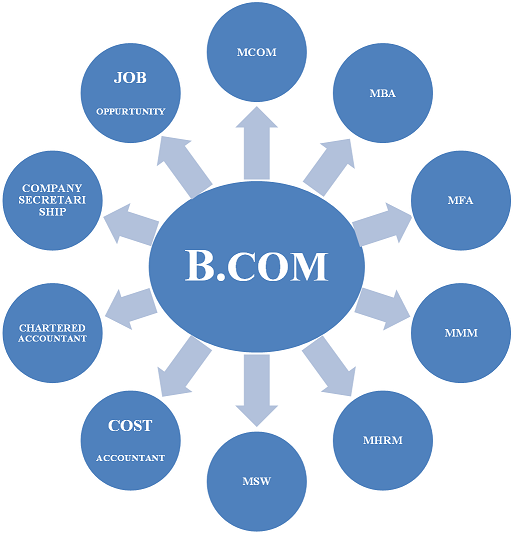Bachelor of Commerce (B.Com)

A Bachelor of Commerce (B.Com) is an undergraduate degree program that focuses on commerce and business-related subjects. The course duration is typically three years, divided into six semesters. The structure and curriculum may vary slightly from one university to another, but here are the general details you can expect in a B.Com course:
Core Subjects:
1. First Year:
- Principles of Accounting
- Business Communication
- Microeconomics
- Business Mathematics and Statistics
- Financial Accounting
- Business Law
- Business Economics
2. Second Year:
- Corporate Accounting
- Cost Accounting
- Business Management
- Macro Economics
- Income Tax
- Business Environment
- Human Resource Management
3. Third Year:
- Financial Management
- Auditing
- Marketing Management
- Entrepreneurship
- International Business
- Project Work
Elective Subjects:
Students often have the option to choose elective subjects based on their interests and career goals. Common elective subjects include:
- Banking and Insurance
- Computer Applications in Business
- E-commerce
- Investment Management
- Financial Markets and Institutions
Practical Exposure:
B.Com programs usually include practical exposure through internships, projects, and case studies. This helps students apply theoretical knowledge to real-world scenarios.
Assessment:
Students are assessed through a combination of examinations, projects, presentations, and practical assessments. The assessment pattern may vary across universities.
Specializations:
Some universities offer specialized B.Com programs, such as B.Com (Honors) with a focus on specific subjects like Accounting, Finance, or Marketing.
Eligibility:
Eligibility criteria can vary, but generally, students who have completed their 10+2 education from a recognized board with a background in commerce or related subjects are eligible for B.Com admission.
Career Opportunities:
Upon completing a B.Com degree, graduates can pursue various career paths, including:
- Accountant
- Financial Analyst
- Auditor
- Tax Consultant
- Banking and Finance Professional
- Business Analyst
- Entrepreneur
- Marketing Executive
It's important to check the specific details and curriculum of the B.Com program offered by the university you are interested in, as there may be variations in the course structure and elective options. Additionally, considering the dynamic nature of education, some institutions may have updated their programs after my last training cut-off in January 2022.


Importance Bachelor of Commerce:
A Bachelor of Commerce (B.Com) degree holds significant importance for several reasons, contributing to both personal and professional development. Here are some key aspects highlighting the importance of a B.Com degree:
1. Foundational Knowledge:
B.Com provides a solid foundation in commerce, business, and related disciplines. It equips students with a comprehensive understanding of accounting, finance, economics, management, and other key areas.
2. Career Opportunities:
The degree opens up a wide range of career opportunities in various industries. Graduates can pursue roles in accounting, finance, marketing, human resources, and general management, among others. The diverse skill set gained during the program makes B.Com graduates versatile in the job market.
3. Entrepreneurship:
For those interested in entrepreneurship, a B.Com degree offers valuable insights into business operations, financial management, and market dynamics. This knowledge is crucial for individuals looking to start and manage their own businesses.
4. Professional Certifications:
Many professional certifications, such as Chartered Accountancy (CA), Cost and Management Accountancy (CMA), and Company Secretary (CS), are closely aligned with B.Com studies. Completing these certifications can enhance career prospects and open doors to specialized roles.
5. Further Education:
B.Com serves as a stepping stone for those who wish to pursue advanced studies in commerce or related fields. Graduates can opt for postgraduate programs like Master of Commerce (M.Com), Master of Business Administration (MBA), or other specialized master's degrees.
6. Analytical and Critical Thinking Skills: The coursework in a B.Com program often involves problem-solving, data analysis, and critical thinking. These skills are valuable in decision-making processes, whether in business or personal life.
7. Global Perspective:
As businesses operate in an increasingly globalized world, a B.Com degree provides students with a broad understanding of global business practices, international trade, and economic policies.
8. Networking Opportunities:
University life offers opportunities for networking with peers, professors, and industry professionals. Building a strong network can be beneficial for future career opportunities and collaborations.
9. Personal Development:
Apart from academic knowledge, a B.Com program helps in personal development by fostering skills such as communication, time management, teamwork, and adaptability – all of which are crucial in the professional world.
10. Financial Literacy:
B.Com graduates often have a solid understanding of financial concepts, making them more financially literate and capable of managing personal and professional finances effectively.
In summary, a B.Com degree is important for its ability to provide a well-rounded education, open up diverse career paths, and equip individuals with the skills and knowledge needed in the dynamic world of business and commerce. It serves as a stepping stone for both immediate employment and further education.
